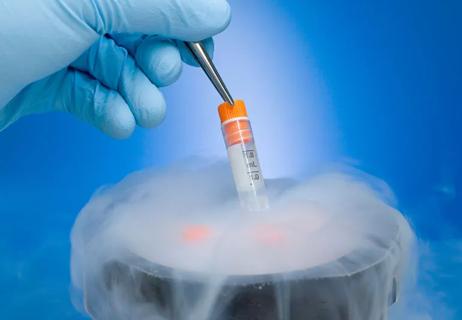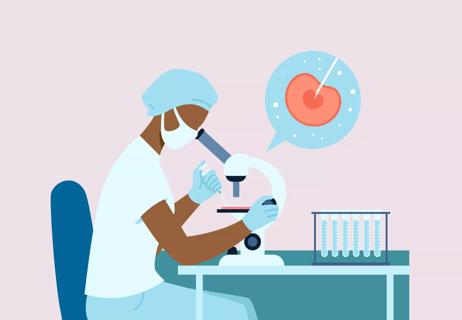These consumer-friendly devices can’t assess male fertility nearly as well as a fertility specialist can

If you and your partner are having trouble getting pregnant, you might be tempted to try one of those at-home sperm testing kits you’ve heard about. It’s cheaper and easier than seeing a doctor, right?
Advertisement
Cleveland Clinic is a non-profit academic medical center. Advertising on our site helps support our mission. We do not endorse non-Cleveland Clinic products or services. Policy
Not so fast.
For proper, accurate male fertility testing, you should be evaluated by a physician and have a semen sample analyzed in a professional andrology laboratory. The availability of at-home testing kits hasn’t changed that, says urologist Neel Parekh, MD.
“Home testing, even with more advanced smartphone-based methods, is an addition to the services offered by fertility specialists,” Dr. Parekh clarifies, “not a replacement for them.”
That said, home tests can still play a helpful role in your family-planning journey. He explains what at-home sperm testing can and can’t do, why you still need to see a fertility specialist and how to get on the path to conception.
The U.S. Food and Drug Administration (FDA) approved the first at-home male fertility tests in 2012. Today, there are several types of FDA-approved test kits available for sale.
Each kind uses a different testing mechanism and provides different information. Some only report whether or not there’s sperm in your semen; others measure the number of sperm per millimeter of semen (known as sperm concentration).
There are also smartphone-based home testing kits, Dr. Parekh explains, which are more advanced, using your phone’s light and camera to record a close-up video of a sperm sample. Most kits require you to attach your phone to another device to evaluate sperm concentration and motility, or how active your sperm are. This is closer to what the computer equipment in an andrology lab does.
Advertisement
But they’re still not all they’re cracked up to be.
“Home test kits differ quite a bit from the kind of testing that we do in an andrology laboratory,” he adds. “Laboratory testing gives us a much more thorough assessment.”
It’s not that home tests are inaccurate, Dr. Parekh notes. It’s that they don’t have the same capacity for testing that laboratories do, so they can’t give you a full picture of your fertility (or of the infertility issues you’re facing).
In an andrology lab, your semen will be evaluated both under a microscope and by a computer — and, of course, looked at by a healthcare provider. Lab testing can determine:
But the information you receive from home testing kits is only a fraction of what’s reported on a formal semen analysis done in a doctor’s office. It doesn’t tell the whole story about what’s going on in your body.
“You could, for example, have 100 million sperm,” he illustrates, “but if none are moving, you won’t be fertile. Only laboratory testing can show you a full picture.”
There are times when at-home semen analysis can be a good starting point.
“A home test can’t — and shouldn’t — replace a professional fertility workup,” Dr. Parekh reiterates, “but it can give you some preliminary information.”
He shares times when home fertility testing could be a worthwhile first step.
When a couple is first trying to conceive, Dr. Parekh says that men typically aren’t checked for infertility unless they’re still unsuccessful in achieving pregnancy after 12 months.
“Doing a home test may help reveal potential problems sooner,” he notes. “But if your results show any potential issues, you’ll have to follow up with a fertility specialist to address them.”
If you have certain risk factors for infertility, like a history of chemotherapy, a home test could provide some encouragement that you’re fertile. But if your results show that you have low sperm count, you’ll need to see a fertility specialist.
“Plus, even if your results seem normal, you could still be dealing with male-factor infertility that isn’t revealed through at-home testing,” Dr. Parekh points out.
Not everyone in the world lives near a high-quality andrology lab.
“In these cases, at-home semen analysis can give you some preliminary information, wherever you are,” Dr. Parekh says.
Advertisement
Again, though, it’s still always best to follow it up with an in-person visit to a fertility specialist who can order lab testing.
Here’s a use case you might not have considered: Home test kits can be a valuable tool for making sure you’re not fertile. If you’ve had a vasectomy, your surgeon may recommend verifying that you’re sterile before you have unprotected sex — usually about two months after your procedure.
“We know that most men don’t actually do this,” Dr. Parekh acknowledges, “so testing yourself at home could be an easy way to be sure the procedure worked.”
Even with advanced smartphone methods, home fertility testing is still best used as a complement to the services offered by fertility specialists — not as a replacement for them.
“Most of us who do this for a living are excited about its potential,” Dr. Parekh says. “But we still believe the in-office assessment is critical.”
Advertisement

Sign up for our Health Essentials emails for expert guidance on nutrition, fitness, sleep, skin care and more.
Learn more about our editorial process.
Advertisement

Oocyte cryopreservation is a proven way to extend your fertility options for the future

These step-by-step instructions will help you perform self-injections like a pro

Various prescription medications and recreational drugs can have an impact

Here’s a helpful starting point as your infertility journey begins

Common causes and when to seek help

Some couples should see a doctor sooner than others

A variety of factors can cause temporary or more lasting changes in penis length

When you’re living with this chronic condition, early diagnosis and treatment can improve your chances of getting pregnant down the road

Even small moments of time outdoors can help reduce stress, boost mood and restore a sense of calm

A correct prescription helps your eyes see clearly — but as natural changes occur, you may need stronger or different eyeglasses

Both are medical emergencies, but they are very distinct events with different causes